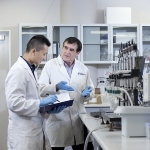Centre for Urology Research (CUR)
Bond University
The Centre undertakes physiological and pharmacological studies of the lower urinary tract with the aim of developing new treatments, or enhancing current treatments, for overactive bladder, prostate and bladder cancer, stress incontinence, benign prostatic hyperplasia, interstitial cystitis and erectile dysfunction. The studies are performed in collaboration with scientists at other universities both in Australia and abroad and with clinical colleagues at local hospitals and radiotherapy facilities. A wide variety of techniques are employed in the laboratories including computer modelling, biochemical assays, cell cultures, in vitro functional experiments including afferent nerve recording, through to in vivo voiding pattern analysis, while translation of our findings is being investigated in retrospective patient studies.
- Website
- https://bond.edu.au/researchers/research-strengths/faculty-research-centres/centre-urology-research-cur
- Organisation type
- University Research Centre
- Number of research staff
- Up to 20 research staff
- Address
- Faculty of Health Sciences & Medicine, Bond University, 14 University Drive, Gold Coast QLD 4229
Strengths and capabilities
- Afferent nerve recording
- Cell culture
- Assays of cell mediators (ATP, Ach, PGE2)
- In vitro functional testing
- Radiotherapy
Facilities and major equipment
- PC2 laboratory
- Radioligand binding laboratory
- Afferent nerve recording facility
- Cell and tissue culture facilities
- Mechanical cell stretch (Flexcell) facility
- In vitro isolated tissue laboratory
Lead researchers
- Director and Professor Russ Chess-Williams—Discovered nitric oxide outside the cardiovascular system. Identified M3 as main human bladder muscarinic receptor.
- Faculty Associate Dean of Research and Associate Professor Donna Sellers—Identified M3 as main human bladder muscarinic receptor. Recognised role of ATP release in the bladder actions of Botox
- Head of Biomedical Science Department and Associate Professor Catherine McDermott—Identified cellular mechanisms causing urological adverse effects after intravesical cytotoxic treatments
Key science sectors
More information about the sectors this centre is involved in:
Update details
Is this your centre? See any issues? Send a request to update your listing.
